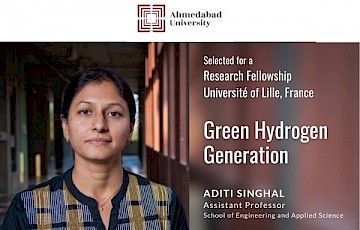26 June 2023
Akhand Rai Receives Science and Engineering Research Board (SERB) Funding for Research on Intelligent Pipeline Leak Detection

In industries, pipelines are vital in transporting liquid and gas resources such as water, oil, and natural gas. During operation, however, pipelines are exposed to corrosion, erosion, and external intrusions producing leakages that, if unnoticed, may cause severe economic losses and environmental threats. This threat underscores the importance of detecting leaks and locating their position immediately after they have occurred. Developing a reliable leak diagnosis system remains a big challenge. Akhand Rai, Assistant Professor, School of Engineering and Applied Science, works on addressing this challenge. He recently received funding from the Science and Engineering Research Board (SERB) to support his research on a leak detection system that can identify early stage leaks in a real-time and automated manner. Sanket Patel, Assistant Professor, School of Engineering and Applied Science, is the Co-PI on the study.
"Acoustic Emission (AE) technology has gained significant attention for pipeline leak diagnosis. AE sensors detect the stress waves from leaking fluids and can capture the leak attributes. The latest boom in artificial intelligence (AI) and data analytics tools has led to the development of various data-driven approaches for AE-based pipeline leak diagnosis. Machine learning (ML) algorithms, such as artificial neural networks and support vector machines, have been applied extensively to analyse AE leak signals. Further, cross-correlation analysis along with signal processing methods, such as wavelet transform, have been utilised to filter the AE signals for precise leak localisation," said Professor Rai.
However, existing techniques have several shortcomings. Traditional ML techniques are supervised and need large amounts of prior-labelled leak data for training. Gathering such failure data in actual situations is a cumbersome task. This renders the present approaches ineffective for automated real-time leak detection. "This difficulty can be resolved by adopting one-class classification-ML techniques (OCC-ML), which are trained with data of only one class. The OCC-ML techniques enable the building of fault detection models using the system's healthy condition data alone. In this project, we will develop leak detection models based on OCC-ML techniques, namely, self-organising map (SOM) and Gaussian mixture model (GMM)."
Usually, AE signals are masked by surrounding disturbances making accurate leak feature extraction challenging. The prevailing methods are inefficient in de-noising and adapting to changes in leak signals as they need to have predefined functions and fixed parameter settings. Professor Rai intends to develop leak localisation models based on the self-adaptive signal processing method, namely, variational mode decomposition (VMD), which uses the AE signal to extract the leak information and is suitable for varying operating conditions. "We will develop an integrated approach for leak detection and localisation based on OCC-ML and VMD techniques. For this purpose, an experimental set-up simulating the pipeline leaks will be developed, and the AE signals will be acquired for further analysis." The proposed research stands to considerably impact financial losses and dangers to life through the wide-scale adoption of intelligent leak diagnosis systems in industries from different fields.



